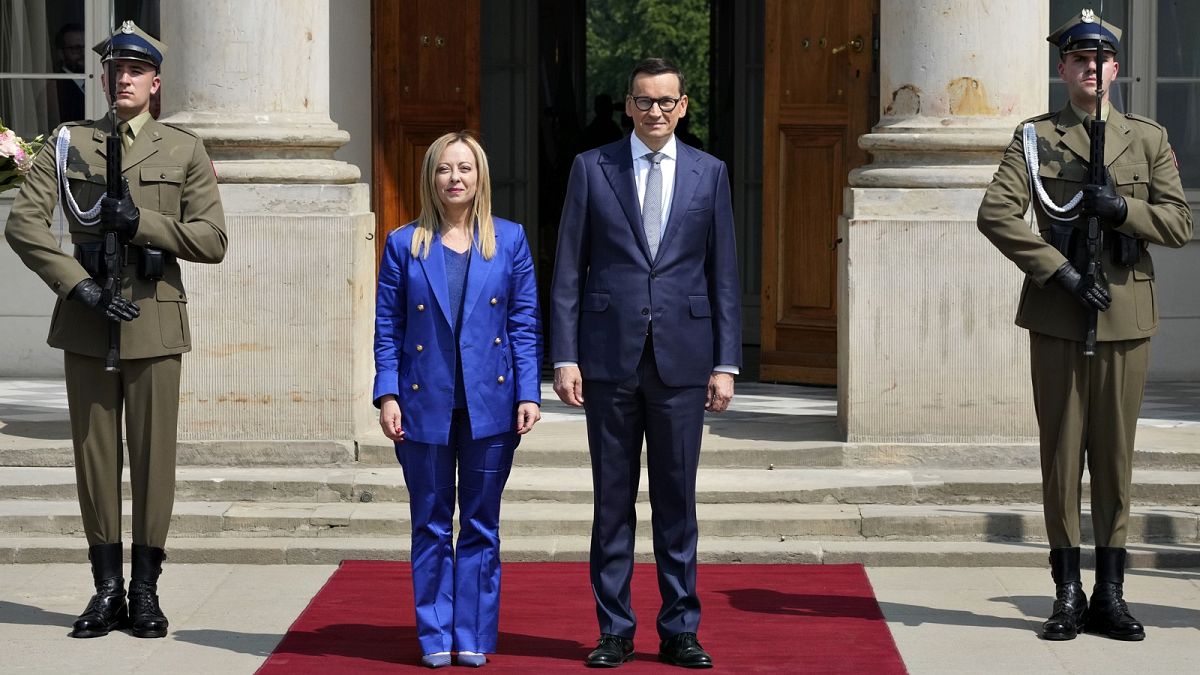Poland’s Law and Justice (PiS) had been courted by Hungary’s Viktor Orbán to join his brand new “Patriots for Europe” alliance.
Poland’s Law and Justice (PiS) has decided to remain part of the hard-right European Conservatives and Reformists (ECR) group, ending days of mounting speculation over the party’s immediate political future.
The news became official during the ECR’s constitutive meeting, which took place on Wednesday in a hybrid version after having been postponed over internal disagreements.
This means PiS chooses to stay with Giorgia Meloni, the dominant figure in the ECR family, and rebuffs Viktor Orbán’s offer to join the so-called “Patriots for Europe,” a new alliance that aims to establish the largest far-right group in the European Parliament.
So far, Orbán’s initiative has attracted Czechia’s ANO, Austria’s Freedom Party (FPÖ) and Portugal’s Chega, all of whom share a deep-seated aversion to the Green Deal, the reform of the EU migration policy, and military provisions to Ukraine.
“Only through the victory and cooperation of patriotic and sovereigntist parties across the continent we can guarantee our children’s inheritance,” says their manifesto.
Forming a group in the Parliament requires a minimum of 23 MEPs, a threshold they already meet, coming from at least seven member states. This means that, as of today, the Patriots lack three national parties.
Due to the ideological similarities, PiS appeared to be a shoo-in for the Patriots. Its 20 MEPs would have rapidly expanded the ranks of the nascent alliance and possibly helped attract additional affiliates.
Last week’s abrupt cancellation of the ECR constitutive meeting, reportedly due to a clash between the two main factions, Poland’s PiS and Meloni’s Fratelli d’Italia, sent alarm ringing about an imminent departure of the Polish delegation.
Mateusz Morawiecki, the former prime minister of Poland, said in an interview that the likelihood of PiS leaving was 50/50. “We are tempted in both directions,” he told Politico Europe, referring to Orbán’s new initiative.
A Parliament official told Euronews that PiS had entered negotiations with other groups.
Meloni or Orbán?
It was not immediately clear what made PiS choose Meloni over Orbán.
The Hungarian premier’s notorious desire to maintain close relations with Vladimir Putin has caused friction with the Poles, who detest the Russian leader and consistently advocate for harder sanctions to cripple his war economy.
Orbán, by contrast, openly questions the efficiency of Western sanctions and is currently blocking €6.6 billion in EU military assistance to Ukraine.
Wednesday’s news offers a sigh of relief to Giorgia Meloni, who hopes to increase the ECR’s influence in the next legislature. Since coming into power, the Italian premier has adopted a more pragmatic stance on the European stage and sought to be part of the bloc’s decision-making process.
Her support was key to unblocking the New Pact on Migration and Asylum, an ambitious reform that her PiS allies frontally opposed. Her clout, however, is still limited: during last week’s negotiations on the bloc’s top jobs, Meloni was excluded by the main centrist parties, prompting a furious reaction.
The loss of her Polish allies would have dealt a new blow to her ambitions: the ECR would have fallen from 84 to 64 MEPs and relinquished its recently achieved position as the Parliament’s third-largest force.
With the plunge averted, Meloni and her peers can continue their efforts to maximise their leverage and strike case-by-case alliances with the centre-right European People’s Party (EPP) to stop environmental legislation and curb irregular migration.
During Wednesday’s meeting, the group elected Nicola Procaccini (FdI) and Joachim Stanisław Brudziński (PiS) as co-chairs for the next five years, consolidating the two delegations as the ones calling the shots inside the group.

